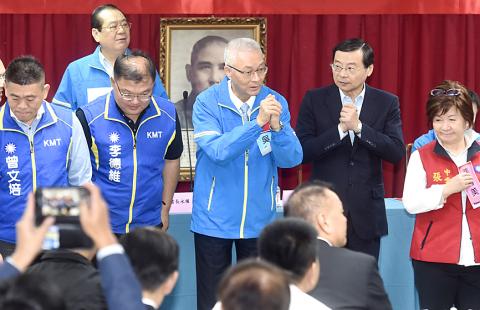Chinese Nationalist Party (KMT) Chairman Wu Den-yih (吳敦義) yesterday said that the party put together its legislator-at-large list in meticulous fashion and he was certain it would garner interest and approval, despite the discontent it has generated.
Wu made the remarks at the meeting of party representatives, who voted on the revised list passed by the party’s Central Standing Committee a day earlier.
The list has taken into consideration public expectations of the KMT and the political situation in Taiwan, Wu said.

Photo: Chien Jung-fong, Taipei Times
The list is a balance of functionality and representation for areas including education, sports, public sanitation and medicine, immigrant spouses, the high-tech industry, young people, labor rights, civil servants, military personnel and overseas compatriots, he said.
Wu asked party members to be understanding that the KMT might have passed over some people, but it could only “correct the wrongs” of the current administration if it wins at the ballot box in January.
All except one of the 34 candidates were approved yesterday, with the exception of former Mainland Affairs Council deputy minister Chang Hsien-yao (張顯耀), who received 19 “no” votes.
KMT Culture and Communications Committee deputy director-general Cheng Mei-hua (程美華) said that according to party regulations, everyone listed after Chang would move up one place, while Wu, as the party chairman, would nominate a member for the vacated 34th and lowest ranking.
Asked about the votes he received to be a legislator-at-large — 127 for and 58 against — Wu said that it was normal to receive some “no” votes.
The KMT would be an authoritarian party if he only got “yes” votes, he said.
Meanwhile, retired general Wu Sz-huai (吳斯懷) — who took fourth place on the list, despite criticism over his attendance at an event in Beijing in 2016 to celebrate the 150th anniversary of Sun Yat-sen’s (孫逸仙) birth and standing for the Chinese national anthem — yesterday said in his introduction at the meeting that he “pledges to defend the Republic of China [ROC] for the rest of his life.”
The ROC is “the one founded in 1911 by the KMT and not the ROC Taiwan that [President] Tsai Ing-wen (蔡英文) speaks of,” Wu Sz-huai said.

MAKING WAVES: China’s maritime militia could become a nontraditional threat in war, clogging up shipping lanes to prevent US or Japanese intervention, a report said About 1,900 Chinese ships flying flags of convenience and fishing vessels that participated in China’s military exercises around Taiwan last month and in January last year have been listed for monitoring, Coast Guard Administration (CGA) Deputy Director-General Hsieh Ching-chin (謝慶欽) said yesterday. Following amendments to the Commercial Port Act (商港法) and the Law of Ships (船舶法) last month, the CGA can designate possible berthing areas or deny ports of call for vessels suspected of loitering around areas where undersea cables can be accessed, Oceans Affairs Council Minister Kuan Bi-ling (管碧玲) said. The list of suspected ships, originally 300, had risen to about

DAREDEVIL: Honnold said it had always been a dream of his to climb Taipei 101, while a Netflix producer said the skyscraper was ‘a real icon of this country’ US climber Alex Honnold yesterday took on Taiwan’s tallest building, becoming the first person to scale Taipei 101 without a rope, harness or safety net. Hundreds of spectators gathered at the base of the 101-story skyscraper to watch Honnold, 40, embark on his daredevil feat, which was also broadcast live on Netflix. Dressed in a red T-shirt and yellow custom-made climbing shoes, Honnold swiftly moved up the southeast face of the glass and steel building. At one point, he stepped onto a platform midway up to wave down at fans and onlookers who were taking photos. People watching from inside

Japan’s strategic alliance with the US would collapse if Tokyo were to turn away from a conflict in Taiwan, Japanese Prime Minister Sanae Takaichi said yesterday, but distanced herself from previous comments that suggested a possible military response in such an event. Takaichi expressed her latest views on a nationally broadcast TV program late on Monday, where an opposition party leader criticized her for igniting tensions with China with the earlier remarks. Ties between Japan and China have sunk to the worst level in years after Takaichi said in November that a hypothetical Chinese attack on Taiwan could bring about a Japanese

STREAMLINED: The dedicated funding would allow the US to transfer equipment to Taiwan when needed and order upgraded replacements for stockpiles, a source said The US House of Representatives on Thursday passed a defense appropriations bill totaling US$838.7 billion, of which US$1 billion is to be allocated to reinforcing security cooperation with Taiwan and US$150 million to replace defense articles provided to the nation. These are part of the Consolidated Appropriation Act, which the US House yesterday passed with 341 votes in favor and 88 against. The act must be passed by the US Senate before Friday next week to avoid another government shutdown. The US House Committee on Appropriations on Monday unveiled the act, saying that it allocates US$1 billion for the Taiwan Security Cooperation Initiative